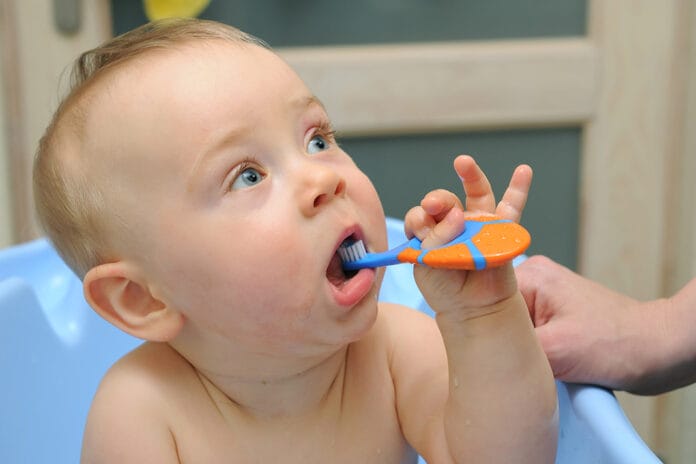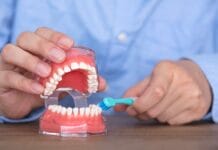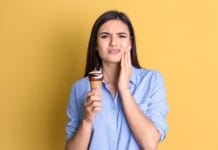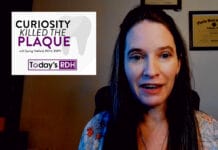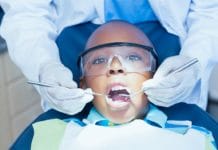Dental hygienists often provide dental care for expectant mothers and new parents, and it is important to educate expectant mothers on how their oral health may affect a baby’s health. Upon providing each pregnant patient with adequate education about her own oral health needs, expectant mothers and new mothers will often ask, “How should I care for my infant’s gums and teeth?”
A dental hygienist has the opportunity to educate parents on the best ways to ensure their infant will have excellent oral health from birth. Each parent should understand the importance of deciduous teeth. It is imperative that parents also understand that teeth and gingival care should begin before the eruption of the first tooth. Baby teeth are important for a number of reasons, such as speaking, eating, and chewing. Baby teeth will influence the shape of a child’s face and hold space for adult teeth to develop properly.
Typically, the first baby tooth erupts around six months old. However, the oral care routine for the infant can begin six months before that. Emphasize to parents that caring for their baby’s gums can really begin right after birth.
First Home Care Routine
Initially, the oral care routine won’t involve a toothbrush and toothpaste. Instead, the recommendations are, after washing your hands with soap and water, use a soft, moistened washcloth or gauze pad to gently rub your baby’s gums, cheeks, and tongue to wipe away any food or liquids. This can be done at least twice per day, but it is especially important to wipe an infant’s gums after feedings and before bedtime.
Cleaning an infant’s gingiva serves to remove and prevent bacteria from adhering to their gingiva.5 Babies naturally have a susceptibility to high levels of bacteria in their mouths. Babies actually produce less saliva than adults; therefore, babies need special care in removing bacteria from within their mouths.2 Bacteria in an infant’s mouth create a sticky plaque, which can lead to damage to an infant’s teeth as they erupt.
Introduction to Dentistry
Upon eruption of the first tooth, the parents have two crucial responsibilities. The first is that it’s time to set up their baby’s first dental appointment. The American Dental Association recommends ensuring a baby has their first dental visit upon eruption of the first tooth but no later than their first birthday, whichever milestone is met first.
Often parents will inquire if a dental appointment is necessary when a baby only has one to two teeth, but even that one tooth is susceptible to decay. A family history of dental caries or a habit of falling asleep while nursing or with a bottle may lead to a higher risk of developing early tooth decay.3 Sharing utensils or any saliva exchange from a parent or caregiver to an infant can introduce dental caries-causing bacteria such as S. mutans and/or Lactobacillus.
Prior to the first dental visit, a dental hygienist can share many recommendations with patients. For example, it is recommended that parents help to prepare a baby for their first dental visit by practicing opening and closing their mouth. This can be done by playing a game of pretend, or a parent can act out what will happen at the infants’ dental visit in order to get their baby acquainted with an experience that involves opening and closing their mouth.
Another helpful recommendation from the American Dental Association is to introduce the baby to books that discuss visiting the dentist. Babies as young as six months old begin to recognize items they’ve seen, so this may help to alleviate their anxiety and fear.
A few more tips that may be beneficial for a successful first dental visit are avoiding scheduling the appointment during nap times, providing the baby with a light meal prior to the appointment, and brushing their teeth.1 Each of these tasks may help to ensure a more pleasant first dental visit.
The First Visit
Dental hygienists can also detail what a parent can expect to happen during their baby’s first dental visit, all while emphasizing its importance. Be sure to share with parents that the dentist will have an opportunity to evaluate for early detection of dental caries and arrest its progression. This will also be an opportunity for the dentist and dental hygienist to advise parents on the prevention of oral diseases in their infants.
The first dental visit is intended to aid the baby in being comfortable within the dental office setting. So their initial appointment is typically shorter in duration. A parent can expect 30 to 45 minutes depending on the baby’s tolerance level. A baby that is willing to be seated in the dental chair without major reluctance is a great first step and may indicate that the baby will tolerate the appointment well.
This visit is intended to be informational for both baby and parents and will include an evaluation of their lips, tongue, inside cheeks, gingival tissues, jaw, and teeth. During this oral evaluation, the dentist will look for decay, mouth injuries, airway issues, and any other pertinent issues involving their oral health. Additionally, the dentist will assess that the jaw and teeth are developing properly. If the dentist has any significant findings during the exam, they will be shared with the parent, as well as any treatment and prevention recommendations.
One common finding may be the discovery of plaque and calculus on the infants’ teeth. If this is the case, and the baby’s disposition allows, it may be recommended that a dental hygienist perform a professional dental treatment to remove the bacteria. This may entail the removal of soft plaque by mildly polishing the infants’ teeth, or gentle hand scaling may be required in instances where calculus is present. During this time, the dental hygienist can continue to provide the appropriate oral hygiene instructions to the parents.
First Patient Education
Oral hygiene recommendations for an infant are important. It is fundamental that parents understand the significance of baby teeth and the important role they have for each child. Explaining to each parent that keeping baby teeth healthy is imperative, even if they are temporary. Ensure that parents understand their posterior molars will actually stay in the mouth until children are about 10 to 12 years old.
Aside from proper brushing and cleansing of an infant’s mouth, there are many other ways parents can help in preventing baby tooth decay. Providing the baby with nutrient-rich foods can help promote healthy and strong teeth. A diet that is rich in calcium, vitamin C, and phosphorus can help prevent baby tooth decay. This may consist of fresh fruits, vegetables, and calcium-rich dairy products.3
Additionally, avoiding grazing and snacking continuously is highly recommended. If an infant’s mouth has continuous exposure to snack foods, there is a greater chance of baby tooth decay. If food is constantly resting on an infant’s teeth, the saliva isn’t given the opportunity to do its job by cleansing the teeth and oral cavity and balancing oral pH.
The next recommendation may seem like an obvious one, but it’s important to remind parents that their baby should consume sugars in moderation. Many foods and snacks may seem healthy but have hidden sugars, such as dried fruits and teething biscuits.
Lastly, infants’ teeth benefit by having them drink water over other liquids. The American Academy of Pediatrics highly recommends that parents should not provide their babies with milk or other liquids besides water over prolonged periods. This is due to added or natural sugars in such liquids, which are metabolized to acid by bacteria in the mouth. This acid is hazardous to baby teeth because it then can cause demineralization causing the teeth to decay.3
Phasing Into Self-Care
This brings us to the second crucial responsibility of parents upon the eruption of baby teeth, which is establishing their baby’s oral hygiene care routine. It is important to share with parents that baby tooth decay is entirely preventable and that there are many ways to prevent it. Parents can begin brushing an infant’s teeth as soon as that first tooth erupts. Eruption of the first tooth typically happens around six months old, but it can range up to 12 to 14 months old.
Many tools are available that help to make brushing an infant’s teeth easier, such as finger brushes and training toothbrushes. It is critical that the toothbrush bristles be extremely soft to avoid trauma and irritations to gingival tissues. Soaking the bristles in warm water before applying toothpaste can help to soften the bristles even further. It is recommended to discard toothbrushes that have become rough at the edges or that are more than two to four months old because mouth bacteria residue can remain on the toothbrush.4
The American Dental Association advises the use of fluoride toothpaste as soon as a baby’s first tooth erupts; however, the application of fluoride toothpaste should be introduced as no more than a rice-grain size smear until the child is older than three.3 A dental hygienist can inform parents that since an infant doesn’t know how to spit, it is likely an infant may swallow some of the toothpaste, but it’s not a concern due to it being such a small amount.
As a baby increases in age, then it will be essential to teach the child how to brush their teeth. However, dexterity and frustration are common issues in the beginning. It is recommended that parents continue to help their infant, toddler, and young child in toothbrushing until they can adequately remove plaque on all teeth independently. A few helpful tips in encouraging independent brushing are by having the baby watch their parent brush their own teeth, singing songs while brushing, and allowing the baby to play with their toothbrush.
Good oral hygiene should start at an early age. A dental hygienist has an opportunity to promote early dental visits and create awareness about the importance of primary dentition. A dental hygienist can educate the ways in which a parent can help their baby prevent early tooth decay. Educating parents and providing oral hygiene recommendations for infants can help to benefit their overall oral health and helps to encourage good habits throughout their life.
Now Check Out the Peer-Reviewed, Self-Study CE Courses from Today’s RDH!
Listen to the Today’s RDH Dental Hygiene Podcast Below:
References
- Your baby’s first dental visit. (n.d.). American Dental Association: Mouth Healthy. https://www.mouthhealthy.org/en/babies-and-kids/first-dental-visit
- Higuera, V. (2020, June 18). Cleaning Your Baby’s Tongue at Any Age. Healthline. https://www.healthline.com/health/baby/how-to-clean-baby-tongue
- Donaldson-Evans, C. (2021, August 6). When should baby visit the dentist for the first time? What to Expect. https://www.whattoexpect.com/first-year/teething/when-to-visit-dentist.aspx#what
- Taylor, M. (2020, July 15). Brushing baby’s teeth. What to Expect. https://www.whattoexpect.com/first-year/teething/brushing-baby-teeth.aspx
- Watson, S. (2021, November 2). Baby Teeth Care: Brushing first teeth, teething, Gum Care, and more. WebMD. https://www.webmd.com/parenting/baby/caring-babies-teeth

